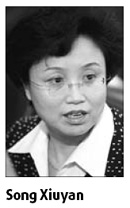Government and Policy
From 1st female governor to representing all women
By Wang Zhuoqiong (China Daily)
Updated: 2010-01-14 08:02
 |
Large Medium Small |
Song Xiuyan made her name when she was elected the youngest and only female governor in the country in 2005.
Yesterday she was in the spotlight again, appointed to head half of the country's population.

Song, 55, was elected as first secretary of the secretariat and vice-president of the All-China Women's Federation, the top organization to protect women's rights and interests and to promote equality between women and men.
She resigned as governor of Qinghai province in Northwest China on Tuesday after 27 years of working in the province.
The province has a population of 5.4 million and an area twice the size of Germany.
Born in 1955 in Liaoyang, Northeast China's Liaoning province, Song studied in the Beijing-based China Youth University for Political Sciences, the only college affiliated to the China Communist Youth League, in 1985.
She joined the Party in November 1978.
At 16, Song worked as a junior telegraph operator at a railway bureau in Gansu province in Northwest China. She was "obedient, self-restrained and capable of fulfilling any task" in the eyes of her superiors.
Eight years later, Song was promoted as the deputy Party secretary of Qinghai provincial Communist Youth League.
| ||||
But Song embraced it as an opportunity. When Hualong county of the region encountered a severe hailstone that hit 133 hectares of farm land, she visited the victims in the fields and allocated about 300,000 yuan ($44,000) in relief funds immediately, said Lu Yulin, then county chief.
Her problem-solving capacity earned her a promotion to lead the department of personnel and labor in the province.
Thanks to her wide range of posts, she was elected governor of the province on Jan 22, 2005 at the age of 49.
As the only female governor and the third since the founding of New China, Song said she has never felt any difficulty in performing her duty as a woman.
"Most of my colleagues are male but all of them support me," she told China Daily in 2006. "I do the same as male governors serving the people. Female leaders sometimes show a stronger will and a broader mind in times of difficulty."
Such experience will be a great asset for disadvantaged women in the community and villages, said Wang Xingjuan, founder of The Maple Women's Psychological Counselling Center Beijing, a major non-governmental organization that supports women's rights.
The former governor's new appointment is a sign of the importance the government attaches to woman's work, said Zhu Lijia, professor of the China National School of Administration. "It is only the second time a provincial governor-level official has headed the organization," Zhu said.
However, women's participation in government posts is still low.
Only 21 percent of deputies to the National People's Congress are women, compared with 30 percent by UN standards.
Female officials took up 6.5 percent of the positions in the provincial level election in 2008.









